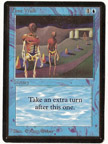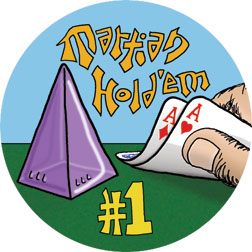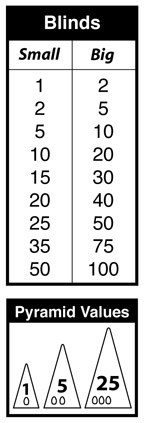
[Looney
Labs] [Shopping
Center]
 
News Archives
-

- [Guide] [Games] [E-Books]
[WTS]
 
- The Woodloucifer

pea-souper ('pee 'soo-pur) n.
a heavy thick fog. synonym: pea-soup


 
Starship Exeter

"Thanks for the support, the games look great, the display
looks great, and the upsells and catalogs look great. We made
a good choice by adding you to our product line." -- a new Looney Labs retailer, Jared of Distraction
Games, after receiving our POP
display
|

|
|
 |
Martian Hold'em and Floating
Tournaments |
|
|
 Like
a lot of people, I have become keenly interested in poker during
the course of the past year. This represents a dramatic shift
in my attitudes about the game... for most of my life, I've generally
shunned poker, having found it boring. What changed? The game
itself! In case you've been living under a rock on Mars,
there's this relatively new version of poker called Texas Hold'em,
which has re-invented the flawed original and turned it into
something a gamer like me can really sink his teeth into. Like
a lot of people, I have become keenly interested in poker during
the course of the past year. This represents a dramatic shift
in my attitudes about the game... for most of my life, I've generally
shunned poker, having found it boring. What changed? The game
itself! In case you've been living under a rock on Mars,
there's this relatively new version of poker called Texas Hold'em,
which has re-invented the flawed original and turned it into
something a gamer like me can really sink his teeth into.
What's different? I have a list of reasons why
Hold'em is better than basic 5 card poker, but also, being
a professional game designer, I've come up with a few tweaks
of my own. It started with substituting Icehouse pieces for traditional
poker chips, and now I have a list of reasons why
pyramids are better than chips. When you add in our other
house rules, the game becomes alien enough to be worthy of having
its own name, and now that we have the Rules for Martian
Hold'em, we just couldn't resist planning for a Martian
Hold'em Tournament at Origins.
This also leads us to consider doing a floating
tournament for Just
Desserts, too.
WHY HOLD'EM
IS BETTER THAN ORIGINAL POKER
- Superior Game Design. Hold'em is a much more complex
and interesting game than plain old poker. There's just not enough
action in the original "draw 5, trade out a few, then compare"
formula to hold my interest. The shared cards, the flop, the
turn, and the river, plus all the additional opportunities to
raise the stakes, all add so much more depth to the action of
Texas Hold'em.
- You can't just buy your way out of a bluff. In classic
western-style poker, you can keep on raising the bet until the
other guy either straight-calls or folds, and once your chips
are into the pot, you can't back out. Thus, if you can't keep
up with the raises, you must fold, and lose your investment without
even getting to show your hand. (This point was central to the
plot of the classic poker-game western, "A Big Hand for
a Little Lady," starring Henry Fonda.) But in Hold'em, the
economy is closed, which means the maximum you can ever bet is
all the chips you currently have (called going "All-In").
Moreover, the stakes are automatically lowered to the amount
that makes it All-In for the player with the least amount of
money. (Side bets keep the action going if more than 2 players
are involved.) This means I can't force you to throw down your
superior hand just because I'm willing to put my car keys into
the pot and you're not.
- Playing tournament-style brings the game to a dramatic
conclusion. The elimination-format of Hold'em turns poker
into a game you can play -- and become mentally invested in --
even if you aren't playing for money. In contrast, I've never
felt like there was any point to regular poker if you weren't
playing for money, since the open-ended nature of a ring-style
game means the game never really ends: If you lose, you just
keep buying more chips until you decide to quit. But in a tournament-style
game, everyone begins with a fixed number of chips, and that's
all. (Some tables allow one-time re-buys, but we usually don't.)
The closed economy of the tournament-style game means that when
you go All-In, and lose, you're out. When combined with the Blinds
(an escalating minimum initial bet mechanism, which is yet another
difference that makes all the difference), this makes the game
draw naturally to a conclusion, as one player after another is
knocked out until a single player emerges victorious.
These differences are what's made Texas Hold'em the smash
hit it is today, but one change was still necessary to make it
a game I myself would really passionate about: using Icehouse
pyramids instead of traditional poker chips. At first, this
was just an experiment, almost even a joke, but we quickly realized
that the pyramids really do add value, both in fun and functionality.
|
|
 WHY PYRAMIDS
ARE BETTER THAN CHIPS WHY PYRAMIDS
ARE BETTER THAN CHIPS
- Pyramids just look cooler than chips. You could say
that this is a matter of opinion, but that's my opinion.
- You can watch where your money goes as you lose it.
Everyone starts with a full stash of one color. (I always get
purple.)
When you lose, your "chips" go off to someone else's
pile, but you can still tell that they used to be yours. On the
other hand, if you win, you can usually trade back for pieces
of your original color, and it's very satisfying to be sitting
on your full original intact stash, plus a pile of other people's
pieces. While ultimately meaningless, this adds a layer of simple
fun and creates some other interesting in-game dynamics. ("Look,
he's betting with his own color! He must really have a hand!")
- You don't have to remember how much different colors are
worth. In some cases, poker chips denote their value numerically,
but most of the sets of poker chips I've seen have been simple
colored disks. How are you supposed to remember that red ones
are 5 and blue ones are 25, or whatever?
- Betting big FEELS bigger. When someone bets with one
of their large pyramids, it has impact. It just feels like a
bigger deal than when you bet with a different colored (and therefore
more valuable) disk.
- Pyramids are more useful, and more portable, than chips.
If you've got a deck of cards and a fancy case of poker chips,
all you can play are casino games. But if you've got a deck of
cards and an Icehouse set, you can play a massive number of different
games, poker included. Also, you'll have more room in your luggage,
since even the most compact of poker-chip sets is bigger than
a bag of Icehouse pyramids.
SPECIAL RULES
FOR MARTIAN HOLD'EM
Martian Hold'em is very similar to standard No-Limit Texas
Hold'em, but with pyramids
instead of poker chips and the following special rules:
- The values are 1, 5, and 25: Regardless of the buy-in
amount, pyramids have the following values: smalls are worth
1, mediums are 5, and Larges are 25.
- Each player starts with a full standard stash of Icehouse
pieces. Ideally, each player will have a unique color, but
this isn't actually required.
- Blinds increase until they reach the maximum shown on
the Blinds chart. Some groups use a 20 timer to drive the
increase schedule, but our system involves keeping track of how
many rounds have been played. The Blinds go up every X rounds,
where X is the number of players you started the game with. (There
are lots of ways to keep track of the number of rounds, including
pen and paper, but we use a small bowl of Zendo
stones: each round, a stone goes into the bowl, and when the
bowl is full, you dump it out and raise the blinds.)
- "No Limit" also means no minimums. In standard
No-Limit Hold'em, you can only raise by the amount of the current
big blind, but I think the blinds provide plenty of mandatory
betting.
- The game ends when all but 2 are out. Some people
really like "Heads Up" poker, but we always stop when
the 3rd Place player goes broke. The downside of an elimination-style
game is that players who wash out early have nothing to do but
wait for the others in the game to finish, and the longer it
drags on with the last few, the more frustrating this can become.
Also, I myself find 2 player poker quite dull... it's the group
dynamic I enjoy, and just as I won't start a game with fewer
than 5, I also don't wish to continue it after critical mass
is gone and the eventual conclusion easy to predict. So, we've
taken to declaring that whoever is ahead when only 2 remain wins
first prize (2/3 of the pot). In the very unlikely event of a
tie at this point, the final 2 will play 2 hands of Heads-Up
Hold'em, repeating in pairs of hands as needed, until the tie
is broken.
THE MARTIAN
HOLD'EM TOURNAMENT AT ORIGINS
Having thus redesigned poker to be a Looney Labs game (I regard
any game that uses Icehouse pyramids as being a Looney Labs game),
I can now see us wanting to play Martian Hold'em at Looney Labs
events, like the up-coming Big Experiment in particular. However,
just as we can't allow toking at a Stoner
Fluxx tournament (unless it's being held in Amsterdam),
we also can't authorize gambling at the Big
Experiment, which is what they might call it if people are
playing Martian Hold'em, for money, in our lab. However, if we
make it a tournament...
OK, so even though Origins is now less than a month away,
and the program book has already gone to the printer, we've decided
to add another event to our bulging tournament
schedule: a floating Martian Hold'em tournament. The medallion
will feature the artwork shown at the top of this page.
Like the floating Binary
Homeworlds tournament which Liam
is pioneering this year, the Martian Hold'em tournament will
run all weekend long. To jump in, all you need to do is find
a group of 4-7 others interested in competing, and start up a
game.
Once a game begins, the Top Rabbit will provide the stakes:
3 special cards we're making, called Bleems. (On ancient Mars,
Bleems were a unit of currency.) The winner will receive 2 Bleems,
while the second place player gets 1. On Sunday at the appointed
hour, the 8 top-Bleem holders will play a final game of Martian
Hold'em, with the Medallion being the ultimate prize.
THE FLOATING
JUST DESSERTS TOURNAMENT
Having thought of all that, it also occurs to us that we're
going to wish we were running some sort of Just
Desserts event at Origins, too. After all, we'll have just
launched the Beta edition (the cards have come back and they
look great!) and you know everyone's going to want to try it,
so wouldn't it be nice for there be to a tourney?
Well, maybe there can be. Since there's no room for more events
on the schedule anyway, perhaps it's just as well we try this
one also as a floating tournament. It will work in much the same
way: with players scheduling games anytime they want (in loose,
"restaurant-style" as we used to say at the earliest
of Icehouse
tournaments). When someone wins, they'll receive some sort
of Bleem-like marker, and at the appointed hour, the 6 players
with the most win-tokens will play a finals match.
The drawback to tournament-structures like these are that
the more you play, the better your chances of winning. But so
what if it isn't "fair"? Tournaments like these become
not just a measure of skill, but also of determination.
|
 Well,
that's all for now. Have a Great Week,
and Thanks for Playing our Games! Well,
that's all for now. Have a Great Week,
and Thanks for Playing our Games! |

 |
To me, the most shocking thing about the story of Schapelle
Corby (an Austrailian woman convicted this week of smuggling
marijuana into Bali, Indonesia) isn't the fact that she was sentenced
to 20 years in jail. What really amazes me is that the prosecutors
are planning to appeal the case, saying that 20 years isn't long
enough, and that a life sentence would have been the "fair"
punishment. (Meanwhile, Abu Bakar Bashir, the terrorist who masterminded
the October 12, 2002 bombing in Bali, which killed 200 and injured
200 more, got only 2 years in jail.) |
 |
"For more than four years -- steadily, seriously, and
with the unsentimental rigor for which we love them -- civil
engineers have been studying the destruction of the World Trade
Center towers, sifting the tragedy for its lessons. And it turns
out that one of the lessons is: Disobey authority. In a connected
world, ordinary people often have better access to better information
than officials do... After both buildings were burning, many
calls to 911 resulted in advice to stay put and wait for rescue...
Fortunately, this advice was mostly ignored."
-- Gary Wolf, "Question Authorities: Why It's Smart to Disobey
Officials in Emergencies," Wired Magazine, June 2005 |
 |
"18. A person who is nice to you, but rude to the waiter,
is not a nice person." -- Dave Barry's list
of 19
Things It Took Him 50 Years To Learn |
|
|
 |
|